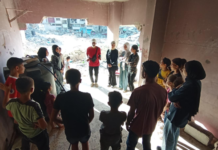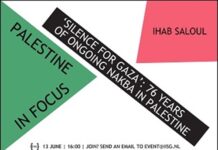Yasmin Abusayma
The Electronic Intifada / July 12, 2024
I was always curious about the world beyond the Rafah crossing.
Does the air outside Gaza smell different?
Are people in other places happier?
Do they lead dignified lives, free from the incessant hum of drones and the fear of bombing?
Do they really feel safe?
Do they face their own restrictions?
Do they share our struggles, endure power cuts or have to overcome bureaucratic hurdles so that they can travel?
How long do they have to wait before traveling?
Do they feel bored?
Do they have nightmares like us?
Although I am 30, I had never left Gaza until May this year. After enduring months of displacement, bombings, hunger, fear and severe deprivation, I had no choice but to leave.
The war shattered every fragment of hope that we had.
Our home – on which we had worked so hard – was destroyed.
It broke my heart when I encountered too many questions from my children. Questions that I could not answer.
“Mom, why can’t we go home?”
“Where are our toys?”
“Why can’t we go to our kindergarten?”
My husband and I made the heart-wrenching decision to leave Gaza, driven by a desperate need to save our children Taim and Tia. They had only known a cramped room – devoid of life’s necessities – for many months.
There was an inner voice speaking to me.
“Run, Yasmin,” it said.
“Run as fast as you can. You don’t have to stay here.”
Agonizing
Leaving was agonizing.
How could I abandon my father and siblings to face the ravages of war alone?
How could I forsake my roots, my identity and my memories?
Yet, in that moment of choice, the imperative of survival overshadowed everything else, even if it meant leaving parts of myself behind.
We arrived in Egypt on 1 May. My long-held dream of traveling came true, though not in the manner I had ever imagined.
I never wished to undertake a journey under such dire circumstances. I was fortunate to escape less than a week before the Rafah crossing closed, leaving many others trapped behind.
I needed to salvage my mental health, to rebuild and start anew.
This war is unlike any we have previously experienced. Dead bodies littered the streets, people perished from hunger and atrocities beyond comprehension unfolded around us.
Despite being shattered into pieces, Palestinians cannot afford the luxury of despair. The fast pace of life allows no time for falling apart.
So I had to be strong both for my family and for myself.
Egypt, with its ubiquitous lights and constant electricity, overwhelmed me.
I reveled in the luxury of twice-daily showers.
My children danced with joy over simple delights like chocolate milk, fresh fruit, vegetables and chicken.
The internet was accessible, too. Yet, amid this newfound comfort, all I could see were darkness and despair.
My heart ached in the knowledge that Gaza had been deprived of basic necessities for years.
I yearned for a magic wand so that I could reunite with my family.
The last images I saw in Gaza haunt me: Rows of tents, people with pale faces and tattered clothes, men with long beards.
They stood in endless queues for water and searched for firewood so that they could cook.
Each face carried untold stories of suffering and resilience.
I questioned why we, Gazans, were condemned to misery.
Why should young people spend their best years in such conditions instead of advancing their education and starting jobs?
What sin had we committed to deserve this life?
I longed to feel human again.
Worst fears confirmed
My father, two brothers, their families and my in-laws remain trapped in Gaza, grappling with the ongoing genocide.
I remember my father’s call soon after we arrived in Egypt, asking what we had for lunch. I lied, saying we had fried potatoes, knowing deep inside that he would envy us even for that.
Daily calls to my family end in tears, a cruel reminder of what they endure. They call it “survivor’s guilt.”
Why must my 59-year-old father walk for long distances to search for water under a scorching sun, cook on open fires due to gas shortages and subsist on canned food?
My sisters-in-law have been diagnosed with hepatitis A due to contaminated water and poor nutrition, while my 3-year-old nephew cries for fruit that is unavailable. How can I explain all of this?
My mind reels at the thought of having left Gaza.
My family in Gaza are living in cramped conditions. Nine of them are in Nuseirat refugee camp, enduring pollution, mosquitoes and stray dogs.
When Israel carried out a massacre in Nuseirat on 8 June, I was unable to reach my father or brothers. I tried to contact them many times but there was no response.
I asked a friend of mine, who is still in Gaza, to get in touch with them. She confirmed my worst fears: the Israeli military was invading Nuseirat and my family were besieged.
Nobody was allowed to escape.
It took two agonizing hours before I could make contact with my family in Nuseirat.
“We were saying goodbye to each other, believing it was our last moment together,” my sister-in-law Lina would tell me. “I was desperately trying to protect my kids from any possible harm.”
My husband’s car was destroyed by Israel that day. That was a devastating blow.
We had bought it just two months before the current war – after saving up for four years.
I felt utterly lost, unable to start anew. Israel had committed a massacre and presented it to the world as a rescue operation.
I feel out of place in this world.
The days pass and the nightmares persist.
In Egypt, I try to embrace my new life but the memories of Gaza remain raw.
I can’t live a normal life as I constantly fear for my family, imagining the worst.
Eid al-Adha arrived but I didn’t celebrate. There were no decorations, chocolates or new clothes for my kids this time and no family gatherings to enjoy the taste of mom cooking meat.
Nobody knocked on the door to say, “Happy Eid.” I spent Eid in tears, longing for last year’s celebrations, realizing how fortunate we once were.
Despite being an open-air prison, Gaza is the best place in the world. I haven’t felt safe since I left and I doubt I ever will.
As the genocide continues, I dream only of reuniting with my family. I pray that I will not lose more people whom I love.
I may have survived physically but the war’s memories haunt me relentlessly.
I left in tears, unsure if I will ever return.
I miss everything about Gaza: the air, the food, the beach, family gatherings.
I long to hug my father and ease his pain.
Yasmin Abusayma is a writer and translator from Gaza












